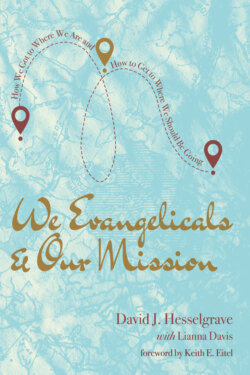We Evangelicals and Our Mission

Реклама. ООО «ЛитРес», ИНН: 7719571260.
Оглавление
Lianna Davis. We Evangelicals and Our Mission
We Evangelicals and Our Mission
Table of Contents
Illustrations and Tables
Foreword
Preface
Prolegomenon
“Based on Classical Christian Orthodoxy”
“Shaped by a Reformational Understanding of the Gospel”
“Beliefs and Behaviors Forged in the Fires of Eighteenth-Century Revivals”
The Great Century and the Gathering Storm
The Aftermath of the Storm, Part One
The Aftermath of the Storm, Part Two
Three Unavoidable Issues in Contemporary Evangelical Missiology
Decisive Differences between Prominent Evangelical Theologians and Missiologists
The Evangelical Crisis and Its Resolution
Postscript
One Millennial’s Response Essay
Bibliography
Отрывок из книги
“David Hesselgrave shaped evangelical missiology in the late twentieth and early twenty-first centuries. During the last months of his life, he penned We Evangelicals and Our Mission, a postscript that traces the history of evangelical missions in order to identify a modern crisis of doctrine and duty. The ‘Dean of Evangelical Missiology’ delivers one final lecture instructing evangelicals how to resolve this impending crisis by reviving historic doctrine and reengaging world evangelization.”
—Matt Queen, Associate Professor and L. R. Scarborough Chair of Evangelism, Associate Dean of the Roy J. Fish School of Evangelism and Missions, Southwestern Baptist Theological Seminary
.....
In this respect as in many others, we are greatly indebted to the brilliant Augustine. “Augustine’s work has shaped the best of the Christian intellectual tradition like few others during the two thousand year history of the church.”18 Most famous perhaps for writings such as Against the Skeptics and The City of God, multitudes of students will remember him best for works that relate to their special interests and needs. In my case that work would be his On Christian Doctrine—a work on hermeneutics sometimes thought to be the church’s first volume on homiletics. In On Christian Doctrine Augustine rethinks his rhetorical learning in Alexandria and characterizes it as “gold from Egypt,” but he makes it clear that its particulars must be examined to ascertain whether or not they are real gold. And he makes it clear that the amount of Egyptian gold available to preachers and teachers of the gospel is meager as compared to the gold to be found in the Bible.
Closing Reflections
.....